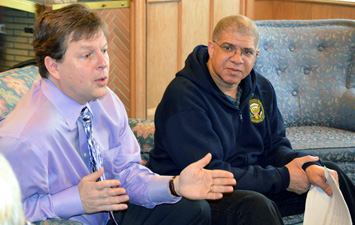Group proposes 'Smart Justice' reforms
 |
| Breean Beggs and the Rev. Lonnie Mitchell present information on the Smart Justice Campaign. |
Attorney Breean Beggs and the Rev. Lonnie Mitchell of Bethel African Methodist Episcopal Church shared their hope that the Smart Justice Campaign can draw supporters to encourage Spokane County commissioners and small cities to be aware there are alternatives to the problems of the criminal justice system that can be safer and more cost effective.
Given that many people who are in jail are mentally ill, their being locked in a cell with little contact makes their situation worse.
Of those in the Spokane County jails, 70 percent are functionally illiterate, 75 percent are unemployed, and 19 percent are people of color—especially African Americans and Native Americans—even though they are less than 8 percent of the area’s population.
“The Chief Justice of the State Supreme Court has said that the criminal justice system is racist and needs to change,” Breean said. “Criminologists say jail makes people worse, more violent and more likely to commit crimes.”
Breean Beggs on Smart Justice Spokane (click to start 7 minute video)
Smart Justice has 30 years of data on what works to reduce recidivism. Given that 70 percent of the county budget is for public safety to operate two jails, Breean and Lonnie called for building a nonpartisan coalition to seek changes.
Lonnie said, “We need to educate people on how to keep the community safe and how we can do better for society. Suggestions and resources are online at smartjusticespokane.org.”
Breean said there are an average of 760 people in the two jails every day at a cost of $120 to $137 each, almost $40 million a year.
Two-thirds are there pre-trial, waiting to be processed, and have not been convicted.
Unless they are dangerous or may flee, he said they could safely use electronic monitoring for 100 of them at $8 a day, saving $112 a day. There is also technology to monitor for alcohol use with the same equipment and there are options to do drug tests for other substances.
“These measures could save millions of dollars a year, because we wouldn’t have to pay for medical care and other costs while people are in jail. They could be out supporting their families by caring for their children or working.
He added that 30 percent of people in jail are there because they missed one of their five court hearings. They might be present if they could receive a text or cell call reminder.
Many others are in jail because they did not pay traffic tickets or were driving with their licenses suspended. Those misdemeanors could be decriminalized and a process could be set to reinstate the license, have education and pay $25 a month on overdue tickets.
Drug courts, mental health courts, veterans courts, drunk driving courts also help address problems and needs, rather than evaluating someone solely based on the crime for which they were arrested time. A more comprehensive assessment of all their problems and dangers of future crimes should be conducted so they have intervention that better protects the public. Those require expanding pretrial assessments and better drug and alcohol treatment, compared with jail. Addressing needs and treating people reduces recidivism, and shrinks the number of people in jail, Breean said.
He and Lonnie also suggest shrinking the number of people in jail by providing increased resources for housing, employment and education.
“People who have a prison record are often excluded from housing, financial aid and employment,” Breean said. “Unable to get what they need most, they may return to crime, and then we pay the price.”
Lonnie said there is a Smart Justice statement online at smartjusticewashington.org/index.pho/spokane/ and the campaign seeks signers and endorsers to sway county commissioners, the sheriff, police and city councils in the county.
For information, call 251-8713.
Copyright © March 2013 - The Fig Tree




